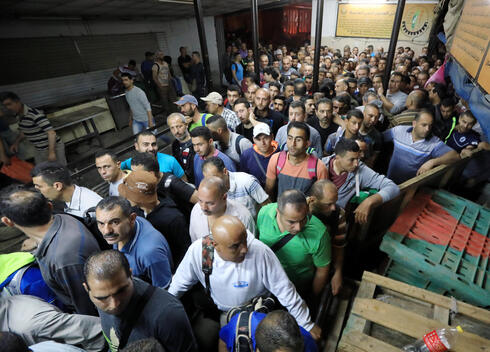
New Palestinian government confronts economic meltdown, Gaza destruction
Incoming Palestinian Prime Minister Dr. Mohammed Mustafa issued a stark warning about the looming economic catastrophe
Mahmoud Abbas, the President of the Palestinian Authority, has approved the formation of the new government led by Dr. Mohammad Mustafa. According to the President's office, the government will be sworn in this Sunday.
This government is defined as a government of technocrats and does not include recognized political figures. It was established under pressure from the international community, which demanded that Abbas carry out substantial reforms in the PA to restore its popularity on the Palestinian street and establish a government in the Gaza Strip after the end of the fighting there.
1 View gallery


Approximately 200,000 Palestinian workers from the West Bank have lost their jobs in Israel since the start of the war.
(Photo: Shaul Golan)
Mustafa presented the government's work plan on Thursday, which includes institutional reforms, financial reforms, strengthening the rule of law, and increasing transparency. However, the government's top priority is handling the humanitarian situation, with an emphasis on the Gaza Strip. For this purpose, a new position in the government was established - the minister of state for emergency relief, to which Basil Nasr al-Kafarna, a resident of Beit Hanoun in the Gaza Strip, was appointed. The government has a total of 23 ministers, most of whom are professionals without a political record, though considered close to Fatah. Representation in the government includes individuals from East Jerusalem, the West Bank, and the Gaza Strip.
The challenges of the new government are enormous, and it is doubtful that it will achieve real progress in the current geopolitical conditions. The economic challenge is particularly daunting, and Mustafa, an internationally renowned economist, is well aware of this. In the work plan he presented on Thursday, he referred to the situation as on the brink of a "major catastrophe." Mustafa mentioned that in the Gaza Strip, the unemployment rate jumped from 49% before October 7 to 89% as of the beginning of 2023. He also noted that in the Gaza Strip, 73% of economic enterprises and 83% of commercial businesses were destroyed.
Related articles:
The incoming Prime Minister emphasized that the economic consequences of the war are also felt in the West Bank, with approximately 200,000 workers losing their jobs in the Israeli market. According to him, about 85% of economic and commercial enterprises in the West Bank reported a decrease in activity. The losses of the private sector in the first four months of the war in the West Bank and Gaza amounted to approximately $2.3 billion, or $19 million per day, noted the Palestinian Prime Minister.
Regarding the financial situation of the Authority, he described it as "unprecedented in its severity." He detailed that the authority owes its employees a total of $745 million, private sector borrowers $1.3 billion, and local banks over $2 billion. Together with debts to the Palestinian Pension Fund, the PA's debts are estimated at about $7 billion.
According to forecasts from recently published international bodies, if the war in the Gaza Strip continues and the situation remains as it is today, the economic blow that the Palestinian economy will suffer will be greater than during the Corona period. According to these estimates, the GDP in the West Bank will drop in the first quarter of 2024 by about 20% - the sharpest drop since the second intifada.
In this state of affairs, the new Palestinian government will need much more than prestige and international support, and above all, generous financial aid to prevent the collapse of the PA and the Palestinian economy.
First published: 13:42, 29.03.24













